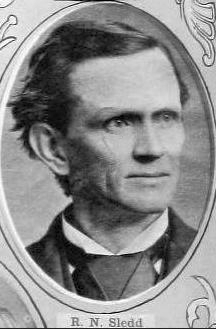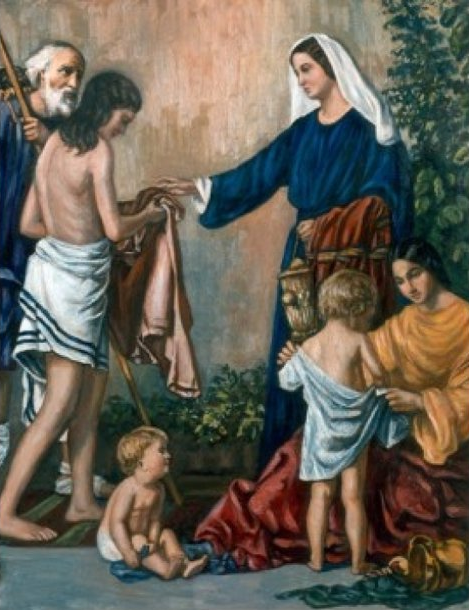Editor’s note: The following is extracted from True Heroism and Other Sermons, by R. N. Sledd (published 1899).
(Delivered before the Woman’s Foreign Missionary Society of the Virginia Conference at its annual session held in Monumental Church, Portsmouth, Va., November, 1885.)
“And your daughters shall prophesy.” – Acts ii, 17.
The text is quoted by Peter from Joel’s prophecy of what would take place in the last days. This prophecy was fulfilled in the outpouring of the Spirit on the day of Pentecost. “This,” said Peter, “is that which was spoken by the prophet Joel.” He did not mean that what they then witnessed resembled what Joel foresaw; but that the prediction was fulfilled in the exact sense intended by the prophet. Joel used the word prophesy in the sense in which it was generally understood in his day. Whatever it meant then, it meant on the day of Pentecost. It is important that we fix its meaning in our minds as definitely as possible in order to a proper understanding and appreciation of woman’s position and privilege and consequent responsibility under the gospel.
The priests were originally the teachers and governors of the people in things spiritual. In course of time they became corrupt and unfit for their high trust. Thereupon, as an agency of reform, and for the conservation of religious truth, a new order, that of prophet, was introduced. There are allusions to this order in the Pentateuch; but it was not developed into prominence and importance until the days of Samuel. He gave it permanence and influence by establishing schools in which young men of promise were instructed in the Law, and in Poetry, and Music.
There were such schools at Ramah, Bethel, Gilgal and Jericho. Men trained in these schools were called “sons of the prophets,” and were recognized as belonging to the prophetic order. From their number the official prophet of the nation was generally chosen. But this was not always the case. The Holy Ghost was not restricted to orders, or to any particular class of instruments. He sometimes passed by the whole prophetic order, and bestowed the prophetic gift in its highest form on the untrained sons of humble toil. And all who are recognized in the Sacred Canon as true prophets hold their place as such not because they belonged to the prophetic order, or had been trained in the schools of the prophets, but because they had the prophetic gift. The gift, and not the order, was the thing essential to the true prophet.
What was that gift? If we consult their personal history and their writings we find that they were poets, historians, politicians. They were the counsellors of those in authority, the expounders of the law, and the teachers and pastors of the people. They were also the instruments of revelation. God made known through them His will concerning His people, and the events that would take place in the future. But their poetry was distinguished from all other by the depth and fervor of its spirituality. Their history was preëminently a record of God’s way in the earth and not merely of human action and motive. Their patriotic addresses were all a presentation and enforcement of religious truth and duty. Their expositions of the law, while not ignoring the ritualistic element, exalted and glorified the spiritual. In a word they were religious teachers. Their mission was to teach religious truth. And whether they spoke in the glowing imagery of the imagination, or recorded facts of history, or expounded what was written, or foretold events to come, their aim was to instruct the people in the things of God. And this we hold to be the scriptural idea of prophesying in the last analysis of the word.
In order to such prophesying it was necessary that the heart be right with God. The man must be in sympathy with the divine heart and will, in deepest, closest fellowship with God and eternal things. He must be filled with the Spirit — the Spirit’s light and gracious influences so filling his mind, heart, conscience, will, that his teaching, while an intellectual exercise, shall be surcharged with the moral and spiritual. Thus transformed by the Spirit, and dwelling in God, and God in him, he is prepared to teach with power and effectiveness. If now the people are to be warned of coming peril, if purposes yet hidden or events yet future are to be revealed, to this man, already the subject of the enlightening and sanctifying power of the Spirit, God speaks, makes known His will and directs its publication. And such is the clearness and emphasis with which God speaks in him, that in the delivery of His message, with an absolute confidence, he introduces it with: “Thus saith the Lord.” Teaching under such inspiration is prophesying in the highest sense of the the word. But all the prophets were not the subjects of this inspiration, and no one of them was its subject all the time. The gift of prescience and prediction was incidental rather than essential to the office. The gift of interpretation, or teaching under the illumination and guidance of the Holy Ghost, was the essential qualification of the true prophet. The degree of his inspiration, whether enabling him to forecast the future or not, did not enter into the question of his authority as the messenger of God.
The prophetic order was limited to men. The prophetic gift was occasionally bestowed on women. Miriam is called a prophetess. She was probably a teacher of the women of Israel, and a leader of their devotions. No prediction of future events is ascribed to her. We read also of “Deborah the prophetess.” Her only recorded prophesy is her poem composed and sung in commemoration of her victory over Sisera. King Josiah sent a deputation to “Huldah the prophetess” to inquire of the Lord through her concerning the Book which had been found in the temple. She foretold the evil that was coming on her people. When the infant Jesus was presented in the temple, “there was one Anna, a prophetess, who gave thanks unto the Lord, and spake of Him to all them that looked for redemption in Jerusalem.” Thus we find four women named as specially chosen and endowed by the Spirit for communicating religious truth under the old dispensation.
Woman’s position in Israel was far better than in other oriental countries. She had great liberty. She could mingle more freely with the other sex in the duties and amenities of ordinary life. She had better advantages for cultivation, and was sometimes entrusted with public office. But she was regarded as man’s inferior, and her place as subordinate. In matters of religion she was under restrictions. She was not called to participate in the great religious festivals. In the structure of the temple “the court of the women” was separated from “the court of Israel” by a massive wall. Only the men could appear before God in the holy place; only to them pertained the highest, holiest privileges and duties of religion.
But the “afterward” of which Joel speaks is now at hand. Jesus had come, and, entering upon His public ministry, had declared that His mission was “to bind up the broken hearted, to proclaim liberty to the captives, and the opening of the prison doors to them that are bound.” He lifted up a standard against every form of injustice, oppression and wrong, and sought to adjust all human relations on the immutable principles of right and fitness. He aimed to correct the ruinous errors in which sin had involved our race, and restore every being to his right position, and give to every principle its appropriate sphere and legitimate influence.
His coming, therefore, was a grand epoch in woman’s history. It was the signal of her deliverance from the disabilities under which she had labored for ages and her reinstatement in her rightful position. He gave her many tokens of His good will concerning her. He always saluted her with courtesy and tenderness. He defended her against the aspersions of arrogant self-righteousness and heartless cupidity. He openly commended her faith and love. He accepted her loving ministrations, and pronounced blessings immortal upon her. No other teacher had ever spoken to her so tenderly, so thoroughly understood her heart, so fully appreciated her powers, or so deeply sympathized with her in her distresses. It is no marvel that she loved Him and followed Him to the very gates of death, and when all others, save one, had forsaken Him, still kept her place by the cross.
He is borne by Joseph and Nicodemus to His burial. And “the women also which came with Him from Galilee followed after and beheld the sepulchre, and how His body was laid.” Early on the morning of the third day, while it was yet dark, they hastened to the tomb. They found it empty. But an angel was there to comfort and reassure them. They were the first to receive and publish the tidings of His resurrection.
The forty days, with their shadows of mystery and glimpses of glory, have passed; He has spoken His last word to His followers and has been received up into glory. In an upper room in Jerusalem His disciples have assembled for prayer. With them are “the women, and Mary, the mother of Jesus, and His brethren.” While they were thus “all with one accord in one place, suddenly there came a sound from heaven as of a rushing mighty wind, and it filled all the house where they were sitting. And there appeared unto them cloven tongues like as of fire, and it sat upon each of them. And they were all filled with the Holy Ghost and began to speak with other tongues as the Spirit gave them utterance.” The Spirit makes no distinction now. The ancient wall of partition is broken down. The tongues of fire rest upon the women as well as the men. For under the gospel there is “neither Jew nor Greek, neither bond nor free, neither male nor female, but ye shall be one in Christ Jesus;” one in interest in Him; one in spiritual privilege; one in the gift and graces of the Holy Ghost. There is henceforth a common priesthood of all believers, without distinction of age, rank or sex, “and the Holy Spirit is the anointing whereby we are fitted for and consecrated to this priesthood.”
Woman partakes even more largely than man of the benefits of this new order of things. First comes her liberty, the breaking of her old fetters, and the removal of her disabilities; and then her advancement to coequality with him in privilege, and the liberty of joining hand in hand with him in diffusing abroad the savor of the knowledge of Christ. And as she has received the gift, it is her duty, no less than man’s, to “minister as of the ability that God giveth.” This, her endowment by the Spirit for gospel work, was what Joel foresaw, and what Peter declared accomplished on the day of Pentecost.
The gifts of Pentecost were, in part, needful only in that day, and therefore disappeared when the canon of inspiration was completed, and the church had acquired stability and consistency of form and method. But the spirit of wisdom and understanding in the things of God is the permanent heritage of believers. Prophecy in the sense of prediction has ceased; but prophesying in the sense of teaching, under the enlightenment, impulse, and guidance of the Holy Ghost is as truly the function of believers today as when they first went out from that upper chamber in Jerusalem. To every believer “is given a manifestation of the Spirit” for his own and for others’ profit. First become a disciple yourself; next disciple others, is the gospel order.
We have no definite information as to the way in which the women who received the pentecostal baptism exercised the divine gift. The silence of history justifies the conclusion that none of them became preachers in the ordinary meaning of the word. But that they became earnest, loving workers for Christ, and contributed largely to the furtherance of the gospel is abundantly evident. There were ministries of tenderness and love appropriate to their hands as deaconesses. There were classes of young believers over which Philip’s divinely gifted daughters could preside. There were homes of sorrow and want in which Dorcas could find scope for all her zeal in works of charity. Priscilla could take the eloquent Apollos to her home, and with her husband, instruct him more perfectly in the way of the Lord. Paul commends Phœbe, Lois, Eunice, Euodias and Syntiche by name, and makes allusion to others without naming them, “who labored with him in the gospel.” John honors “the elect lady” with an inspired epistle, thus embalming and perpetuating through the ages the memory of her faith and love.
Her liberty, her endowments and her power were thus recognized by the apostles, her sympathy and help accepted, and her influence utilized for the spread of the gospel. What a wonderful revolution is thus almost instantaneously wrought in her condition. There are many contrasts between the old and the new dispensations; not the least striking is the difference in her position, the different estimate put upon her powers, and the wider scope given for her holy activities. Any enumeration of the forces that have contributed to the stability and growth of the church that does not give prominence to her influence is not only defective, but a dishonor to the Spirit whose instrument she is. The truth is that woman is, and has been since the apostolic era, the mightiest human power in the church. She has been, and is today , the right arm of Romanism. Less prominent in Protestantism, she is not less potential in shaping its course, giving efficiency to its agencies, and extending its conquests.
Only within the past century, and chiefly within the current half-century, has Protestantism endeavored to systematize, develop, and use this power in the prosecution of its mission. In its view “your daughters — my handmaids — shall prophesy,” meant practically nothing. But its eyes have been opened, and recognizing in her a force as old as Pentecost, given of heaven to fit her for co-laboring with God and men in subduing all things unto Jesus Christ, it is inviting and leading her forward and bidding her god-speed in her mission of faith and love.
To what grand result has this partial recognition of her power already led! How magnificently is she fulfilling the prophetic testimony! She lays her heart at the feet of Jesus with all its wealth of energy and resource, with a love as tender as that of Mary of Bethany and a devotion as complete as that of the holy women who gathered about his cross. From His feet she has opened pathways in every direction out into the world, into its cellars and garrets, its prisons and hospitals, its homes of sorrow, tears and shame, and across mountains and plains, deserts and oceans into the habitations of cruelty and the region and shadow of death. Along all these pathways she is not simply sending, but with a glad heart is herself bearing to poor humanity the riches of God’s loving kindness and the glad tidings of a better life. To every beneficent, saving enterprise, whether man’s or peculiarly her own, she is giving the support of her sympathy and sanctified endeavor. In her zeal for human good and the glory of Christ, in her self-sacrifice and consecration, and the evident tokens of the Spirit’s power resting upon her, we behold a larger, richer fulfillment of the prophecy concerning her, than Peter saw on the day of Pentecost.
A still grander fulfillment will be witnessed in the not distant future. Evangelical Christendom is realizing more fully than ever before her privilege and responsibility under the Spirit’s dispensation. Hitherto conventionality has kept her not at man’s side, but far in the background, in a seclusion little less rigid than that of the cloister. Such conventionality some call conservatism. In reality it is unbelief, a practical denial of the Spirit’s gift to her, or a questioning of His wisdom in bestowing it. But as never before in the world’s history, the churches are relieving her of this traditional restriction and opening the way for her to follow the promptings of her love for Christ. And when devout Christian women everywhere find themselves at liberty to pour the full tide of their moral and spiritual energy along the channels of the world’s redeeming agencies, it will not be long before our race will be delivered from the bondage of the oppressor. Society will be regenerated; home life will be glorified; and the church will be made ready, adorned as a bride for her husband.
One principal field of her activities is in the Foreign Mission work of the church. A wonderful interest has been developed in this direction among devout women in all the churches within the past sixty years. Individual women had exhibited this interest and engaged in this work at an earlier day; but it was not until 1819 that there began to be organization and concert of effort. In April of that year, the Female Missionary Society of the M.E. Church was organized in New York, and began its work of “raising funds and other supplies for the missionaries among the Indian tribes in this country and in Canada.” In 1848 the Ladies’ China Missionary Society was organized in Baltimore, and undertook the support of a female school in Fuchow. “Let this school,” wrote Dr. Durbin, “be the honor and lighthouse of Baltimore in the midst of more than 400,000,000 people who give to death more than half their female children.” Since 1861 twenty-two Societies have been formed, and are now in successful operation, representing all the evangelical denominations of the country. The grand total of their receipts, since their organization, is between $8,000,000 and $10,000,000. The Societies of the different branches of the Presbyterian Church have made the largest contribution to this total; the Congregationalists hold the second place on this roll of honor; and the Methodists the third place. Thus, though Methodist women organized and worked in this field forty years before the women of any other Church entered it, and though the numerical and financial strength of their Church exceeds that of any other denomination in the land, they have been surpassed, if not in zeal, yet in success by the women of two sister Churches. While we rejoice in the efficiency and success of others let it provoke us to increased diligence and activity.
The funds raised by these Societies are being used in well-nigh every quarter of the globe in the establishment and support of Christian schools, in the support of Missionaries and Bible-women, in building churches and hospitals, and in caring for the suffering. The workers, foreign and native, who are supported by these Societies may be counted by the thousand. God has given the word and great is the company of those who have responded, and have gone from the light and immunities of a Christian civilization and the comforts and endearments of Christian homes into the darkness of paganism to tell their degraded sisters the story of Jesus and His love. They have gone under the sweet constraints of His love, in search of His lost ones in the wilderness, glad to encounter pain and endure privations to rescue the perishing and bring them safely into the fold. And they are gaining access to those innermost shrines of moral darkness and corruption, the homes of heathenism, and from these hiding places of death they are gathering precious jewels for the crown of their King.
Unbelief, looking on the self-sacrifice and consecration of these devout women, may ask with as much reason today as on the day of Pentecost, “What meaneth this?” Faith replies, “This is that which was spoken by the prophet Joel” — the fulfillment of the prediction as the fruit of the baptism of power.
My sisters of the Virginia Conference Woman’s Missionary Society, I bid you god-speed in all your endeavors to send the message of salvation to them that dwell in darkness. Our Church has been among the last to invoke woman’s aid in this work. Your Society is yet in its infancy. As yet it has enlisted sympathy and activities of comparatively few of your sisters. The cooperation of your brethren is but partial. There are some who still cavil, and whose spirit is that of opposition. But when God crowned those women of the olden time with tongues of fire and filled them with the Holy Ghost He accredited your sex for gospel work. The results of your efforts at the present day are your divinely authenticated credentials. And if God be for you who can be against you? If He smile upon you surely you cannot falter for a moment under the frown of caviling men and women.
The results, so far accomplished, are by no means commensurate with your hopes. The consciousness of your feebleness may sometimes awaken misgivings, and apparent failure may discourage you and chill your ardor. But in the order of God agencies that seem the feeblest often achieve the grandest and most far reaching results. Of one thing you may be sure: honest, earnest, loving Christian endeavor is never wholly fruitless. We may see no beneficent results, and conclude that we have labored in vain. But long, it may be, after our lips are sealed and our hearts are still, the words of truth we have uttered and the deeds of love that we have done in Jesus’ name will enrich and glorify the lives of those among whom we have lived, and labored, and died. And the fruit will continue to multiply and reproduce itself in increased richness as the years go by.
Go forward with unwavering purpose, unflinching courage, and unfaltering faith in God. Live in conscious fellowship with Him. The caviling and the indifferent, “seeing your good works,” will ere long be silenced, if not enlisted in your behalf. The sympathies of the church will be quickened, your numbers will be multiplied; your means and opportunities will be enlarged; and results far beyond your present anticipations will crown your labor of love.
It will not be long before Jesus will come to reward His servants. The signs are full of promise. Holy men and women all over the earth are turning their eyes heavenward, and out of longing, loving hearts are crying, “Lord Jesus come quickly.” “Behold I come quickly” is His response; “Do not grow weary, my loved ones, of the toil, the strife and tears, the watching and waiting; for I come quickly.” Precious word! He is coming! He is coming! Faith’s quick ear may almost hear the roll of His chariot wheels, and faith’s quick eye almost see the celestial fire flashing from their burning rims as he rushes down the shining pathway of the skies. And when He comes, in the van of the mighty host that will shout Him welcome, side by side with the foremost of the sons, will be found the daughters of Zion. In that glad hour, in His look of love and word of commendation, you will find infinite reward for all your toil.










